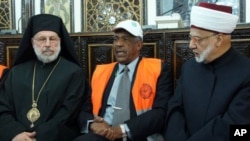As pressures mount on the Syrian government, those at the center of power are working hard to keep whatever allies they have close at hand. Those so far seem to include many of the nation's religious minorities.
Syrian religious leaders put on a show of solidarity for Arab League peace mission monitors, highlighting the country's long history of tolerance among disparate beliefs.
At a meeting in the capital Tuesday, the Mufti of Damascus, Abdel Bari Atwan, said Muslims, Christians and all other sects are "united 'as one hand.'" There is no bias, he added, since "we are all under the protection of the homeland."
The deputy of the Roman Catholic patriarchate, Bishop Louka el Khoury, agreed, saying the tolerance practiced in Syria takes a special place in the world.
When Muslims first came to Syria, el Khoury said Christians did not fight them, and the two have been living together as brothers every since.
Both men blamed the unrest on people not following the path of religion.
Arab League monitor Jafaar Kubaida, who noted the neutrality of the mission, said he has experienced first hand the divide religion can pose in his homeland, Sudan.
He added that Syria should thank God that it is not that way here.
But there are signs that a tradition of tolerance is under stress. Opposition forces include religious minorities, but in sheer numbers are dominated by Sunnis, who make up three-quarters of the population.
Many Sunnis are rebelling not only against the heavy hand of the state, but also the 40-year rule of the Alawite Assad family and the prominent positions given to members of the minority Shia offshoot.
The Alawites have long counted on Syria's other minorities for support, including Christian groups and Druze, in turn guaranteeing them religious freedom and protection as well as high-profile government jobs.
Support for the government can be heard on the streets of the Christian Bab Touma district of Old Damascus, and not necessarily because a government minder is present.
Outside the Mariamea church, Orthodox Catholic Bishop Tony Phillipos Yazji echoes the statements of other Christian leaders.
Yazji says the church always supports peaceful demonstrations and reform. But he condemns the violence as a destruction of the country carried out by paid agents.
Part of the support heard among some Christians and Druze may reflect not so much support of the government, but concern about what might replace the current regime.
They have seen the rise of the Muslim Brotherhood and other Islamists in post-revolution Tunisia and Egypt, and attacks on Coptic Christians in Cairo. There is also the specter of Iraq, where Christians fled persecution in the chaos following the U.S.-led invasion, many to Syria.
The government has played up the idea of its opponents as extremists. But reprisal attacks on Alawites in cities like Homs and Hama have added to the real fears of all minorities.
Syria's Religious Minorities Wary of Uprising




